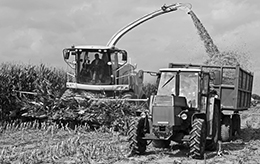 News & Findings
News & Findings
2020 Study Update
- Message from the Executive Committee
- Autoimmunity and Autoimmune Diseases in the AHS
- AGRICOH: A Consortium of Agricultural Cohort Studies
- Ongoing Surveys and Special Studies
Message from the Executive Committee
With your help and participation over the past 25+ years, information from the Agricultural Health Study (AHS) has led to a better understanding of the health of farmers and their families. In this newsletter, we share some recent findings and ongoing study activities. If you would like more information, please visit http://aghealth.nih.gov/ or call 1-800-4-AGSTUDY (1-800-424-7883).
Autoimmunity and Autoimmune Diseases in the AHS
Our immune system is a key weapon in fighting off infections and foreign invaders. Sometimes our bodies attack our own tissues, creating damage and leading to an autoimmune disease. There may be 100 or more autoimmune diseases. Some of the best-known include rheumatoid arthritis, lupus, certain thyroid diseases, type 1 diabetes, and multiple sclerosis.
While the specific causes of autoimmune diseases are usually not apparent, they are often more common in people with a family history of autoimmune diseases and in women. Rheumatoid arthritis, and some other autoimmune diseases, may be more common in farmers. For this reason, we have been studying specific farm exposures, including pesticides, and tasks in relation to rheumatoid arthritis and thyroid diseases. (see 2018 and 2019 newsletters for specific findings; https://aghealth.nih.gov/news/).

These conditions can be preceded by markers detectable in blood, sometimes many years before diagnosis. We recently measured one of these markers—anti-nuclear antibodies (ANA)—in blood samples from male farmers enrolled in the AHS Biomarkers of Exposure and Effect in Agriculture (BEEA) study. ANA can be detected in about 15% of the general population, mostly at lower levels. Higher levels of these antibodies are less common and are often seen in patients with an autoimmune disease.
In the BEEA study, 21% of male farmers had low levels of ANA. Higher levels (but not as high as those typical of autoimmune disease patients) were seen in 9% of the farmers and were associated with greater use of certain organochlorine insecticides (chlordane, heptachlor, aldrin or dieldrin) and the carbamate insecticide aldicarb. These findings suggest that some of these pesticides may affect the immune system.
Research on immunity is relevant to other diseases. For example, some infections and cancers of the blood and immune system are more common in patients with autoimmune diseases. We are now studying shingles (caused by the same virus as chickenpox) in the AHS; shingles risk increases with aging and may be another indicator of decreased immune function.
Parks, C.G., et al. (2019). Front Immunol., 10:1476.
AGRICOH: A Consortium of Agricultural Cohort Studies
In 2006, we convened a meeting of agricultural researchers from around the world. This group, now a research consortium called AGRICOH (for agricultural cohort studies), has expanded to include 29 studies in 12 countries. The goal of AGRICOH is to pool data in order to evaluate health risks associated with agricultural exposures worldwide. A strength of AGRICOH is the ability to study associations that cannot easily be investigated in individual studies because of uncommon exposures or rare diseases.

The AGRICOH consortium has met several times to discuss ideas, share findings, and plan future collaborative research. Early projects have focused on cancers of the blood and immune system, including lymphomas and leukemias. Using data from the AHS and studies in France and Norway, we studied how the use of many common pesticides might be associated with risk of lymphomas. In general, the results were similar to results from earlier AHS reports; for example, there was an increased rate of non-Hodgkin lymphoma (NHL) among farmers who ever used the insecticide terbufos.
Using data from these three studies we also investigated associations between raising livestock and poultry and these cancers. We found rates of myeloid malignancies, which include certain types of cancers of the blood and bone marrow, decreased when the number of livestock on the farm increased. In contrast, myeloproliferative cancers (a subset of myeloid malignancies) increased when the number of sheep and/or goats on the farm increased. These findings require further evaluation.
References:
Leon, M.E., et al. (2011). Int J Environ Res Public Health,
8(5):1341-57.
Brouwer, M., et al. (2016). Occup Environ Med., 73(6):359-67.
El-Zaemey, S., et al. (2019). Occup Environ Med., 76(11):827-837.
Leon, M.E., et al. (2019). Int J Epidemiol., 48(5) 1519-1535.
Ongoing Surveys and Special Studies

We have been busy updating your health information. If you haven’t already responded to the most recent survey, it’s important that we hear from you! We need to hear from you even if you are no longer farming, whether you are doing well or have health problems. If you need help completing the survey, ask a family member or friend, or call toll-free on 1-855-293-5802. The short survey can be completed online at http://www. aghealthsurvey.org. Log in using the personal identification number or PIN, sent separately. Or, return your survey by mail using the self addressed stamped envelope provided.
Researchers from Michigan State University and Duke University are still contacting some participants for a special study on Pesticides and Sense of Smell (PASS). If you are among the selected participants, we hope you will complete the survey to help us with this important study!

We will soon invite adult children of AHS participants to enroll in a new study focused on how growing up on a farm may impact health in early adulthood and beyond. We will ask this group to answer online surveys about their health and childhood activities, including activities on the farm. You may hear about this from your children!

